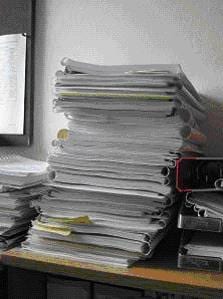Are you still waiting for the “paperless society” that was predicted so many years ago? In reality the amount of paper coming at us has only increased, not decreased. The U.S. post office delivers over 550 million pieces of mail each day, much of it junk mail that we never even need to look at.
From working with many clients over the years, I realize the problem is not paper itself, but the fear of throwing it away. People often hold onto information because “someday” they might need it. The excuses run from, “It’s supporting documentation,” or “If I don’t keep it, I’ll never remember that I took care of it,” to “I need to keep it in case I want to call them again.” Believe me, I’ve heard them all.
Despite this resolve to hold onto all those flat sheets, finding the information when needed is often not an easy task. Papers are lost in file drawers that are stuffed with all the “important information” saved over the years. Or papers are buried in piles that get shoved into a cabinet as company is about to arrive, or as the boss is about to walk into your office.
To keep paper from accumulating:
- You only need to keep supporting tax documents for seven years. If you have information older than that, put it in the shredder and say goodbye. (Note: always check with your tax preparer to be sure).
- Keep a recycling bin and shredder close to where you process papers. Much of what comes across your desk will end up there eventually.
- Create “To-Do” lists for things you need to remember, don’t use the paper as a reminder. If you have files for “action items” you encounter regularly, you’ll know what to do with the paper. Suggested files for most people include: “Calls to Make”, “Bills to Pay”, “People to Contact”, “Things to Read”, and “Awaiting Someone Else (someone needs to get back to you before you can take the next action).”
- If you have original packaging and manuals from electronics and appliances that you no longer own, get rid of them. If you still own the item, get rid of the box, and store manuals and instructions in a file together. Just remember to throw the manual away when you get rid of the item.
- You do not need to keep the receipt for every single purchase you make. If you are someone who checks your receipts against your credit card statement, then save them for one month in a file folder, check your bill, then get rid of them. If you have receipts for larger items (furniture, household improvements, business receipts), than keep them in an accordion file by type. If you think you might return something you’ve bought, than hold onto that receipt until the bill comes, staple it to the bill, and file the bill.
- Spend 10 to 15 minutes a day to go through your old files. You’ll be amazed how much stuff you can get rid of and how little is left by the end of the week.
Hopefully these ideas will keep you from asking, “Now where did I put that?” You can feel confident knowing you have kept what you needed and tossed the rest.


